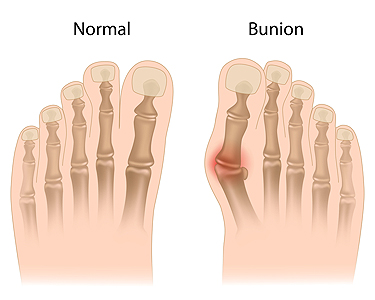Common Reasons a Bunion Can Develop
Monday, 01 March 2021 00:00 A bunion is a bony protrusion that forms at the base or side of the big toe and can gradually develop for genetic reasons. Additionally, wearing shoes that do not fit correctly may also contribute to the formation of a bunion. It appears as a deformity that can cause pain and discomfort. Some patients find mild relief when a protective pad is worn over the bunion, and it may be necessary to wear orthotics. Additionally, it can help to perform specific stretches that can strengthen the toes and surrounding muscles. If you notice a bunion is developing, it is suggested that you consult with a podiatrist who can offer treatment options, such as surgery for permanent removal.
A bunion is a bony protrusion that forms at the base or side of the big toe and can gradually develop for genetic reasons. Additionally, wearing shoes that do not fit correctly may also contribute to the formation of a bunion. It appears as a deformity that can cause pain and discomfort. Some patients find mild relief when a protective pad is worn over the bunion, and it may be necessary to wear orthotics. Additionally, it can help to perform specific stretches that can strengthen the toes and surrounding muscles. If you notice a bunion is developing, it is suggested that you consult with a podiatrist who can offer treatment options, such as surgery for permanent removal.
If you are suffering from bunions, contact Dr. Lee R. Stein of Lake Shore Foot & Ankle, PC. Our doctor can provide the care you need to keep you pain-free and on your feet.
What Is a Bunion?
A bunion is formed of swollen tissue or an enlargement of boney growth, usually located at the base joint of the toe that connects to the foot. The swelling occurs due to the bones in the big toe shifting inward, which impacts the other toes of the foot. This causes the area around the base of the big toe to become inflamed and painful.
Why Do Bunions Form?
Genetics – Susceptibility to bunions are often hereditary
Stress on the feet – Poorly fitted and uncomfortable footwear that places stress on feet, such as heels, can worsen existing bunions
How Are Bunions Diagnosed?
Doctors often perform two tests – blood tests and x-rays – when trying to diagnose bunions, especially in the early stages of development. Blood tests help determine if the foot pain is being caused by something else, such as arthritis, while x-rays provide a clear picture of your bone structure to your doctor.
How Are Bunions Treated?
- Refrain from wearing heels or similar shoes that cause discomfort
- Select wider shoes that can provide more comfort and reduce pain
- Anti-inflammatory and pain management drugs
- Orthotics or foot inserts
- Surgery
If you have any questions, please feel free to contact one of our offices located in Chicago, Highland Park, and Uptown, IL . We offer the newest diagnostic and treatment technologies for all your foot care needs.
Blog Archives
- April 2025
- March 2025
- February 2025
- January 2025
- December 2024
- November 2024
- October 2024
- September 2024
- August 2024
- July 2024
- June 2024
- May 2024
- April 2024
- March 2024
- February 2024
- January 2024
- December 2023
- November 2023
- October 2023
- September 2023
- August 2023
- July 2023
- June 2023
- May 2023
- April 2023
- March 2023
- February 2023
- January 2023
- December 2022
- November 2022
- October 2022
- September 2022
- August 2022
- July 2022
- June 2022
- May 2022
- April 2022
- March 2022
- February 2022
- January 2022
- December 2021
- November 2021
- October 2021
- September 2021
- August 2021
- July 2021
- June 2021
- May 2021
- April 2021
- March 2021
- February 2021
- January 2021
- December 2020
- November 2020
- October 2020
- September 2020
- August 2020
- July 2020
- June 2020
- May 2020
- April 2020
- March 2020
- February 2020
- January 2020
- December 2019
- November 2019
- October 2019
- September 2019
- August 2019
- July 2019
- June 2019
- May 2019
- April 2019
- March 2019
- February 2019
- January 2019
- December 2018
- November 2018
- October 2018
- September 2018
- August 2018
- July 2018







